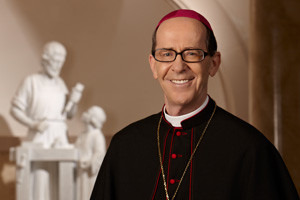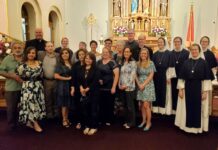St. Basil, writing at the beginning of his Rule for monastic life, said that it is not necessary to teach the love of God because God has already written it within our very nature, just as affection for our parents is written there. We spontaneously have affection for them. Like the other Fathers of the Church, Basil believed that God creates human beings with natural attractions toward goodness and truth, toward happiness and life in community, and above all, with attraction toward charity. This is sometimes called “freedom of attraction.” Education for freedom, then, assists us in drawing from within our own hearts, these natural inclinations toward love of God and neighbor so that we can become ever more guided by love. It also aids us in overcoming the inclinations toward evil with which original sin has weighed us down, and in surrendering more completely to the action of the Holy Spirit, who aids us in coming to full maturity in Christ (Cf. Eph 4:13).

In this fourth part of our series (part one, part two, part three), we shall now consider the third stage of education for freedom, which is known as maturity in charity.
Signs of the third stage of freedom
What are signs that we have progressed to the third level of education for freedom? First, our faith matures to the point that we are able to resist the major threats to freedom, such as those described in paragraph #1740 of the Catechism of the Catholic Church. We have, at this stage, become aware that self-sufficiency and the use of earthly goods to satisfy one’s own interest are false representations of freedom. We now know that blindness to the needs of others and engaging in acts of injustice will injure our moral life, thus injuring our freedom. In other words, each time we act immorally we bind ourselves to vice which makes us less free to do the good. On the other hand, when we act virtuously it helps us to become more free because it is only the virtuous person who has the ability to perform the good when he desires it and who has the strength to avoid the evil he does not desire. As the Catechism teaches (#1740) “By deviating from the moral law man violates his own freedom, becomes imprisoned within himself, disrupts neighborly fellowship, and rebels against divine truth.”
Maturity in human freedom is also shown by a confident assurance in faith that God has called us to a vocation and given us a mission in His Kingdom. We are now convinced, beyond serious doubt, that God has a plan for our life such as the one He revealed through the Prophet Jeremiah (29:11), “I know well the plans I have in mind for you, says the Lord, plans for your welfare, not for woe! plans to give you a future full of hope.”
We see this high level of human freedom beautifully lived out in great saints such a Blessed Mother Teresa of Calcutta and Blessed John Paul II. Their devotion to a cause much greater than themselves was evident to all, even to non-believers. Blessed Mother Teresa spoke of it in this way: she wanted to “do something beautiful for God.” Blessed John Paul said that his whole desire was to fulfill the words of St. Paul found in 1 Corinthians 4:1: “This is how one should regard us, as servants of Christ and stewards of the mysteries of God.”
Master of self yet servant of others
It seems paradoxical yet it is true that as growth in freedom leads to self-mastery it also leads to genuine concern for others. Self-mastery, which is acquired through grace, perseverance, obedience and other virtues, frees us to direct our talents, thoughts and desires to the fulfillment of God’s plan, without undue concern about any difficulties that it may entail. Because we now know that only in God can we be freed from slavery to sin and selfish inclinations, we are now more determined to fulfill His plan for our lives. We find freedom by heeding the words of the Virgin Mary (Jn 2:5), “Do whatever He tells you.”
Whatever Christ tells us will always benefit both ourselves and others, both the common good and the dignity and well-being of each person. The freer we become, the more we wish to live the mystery that Jesus described at the Last Supper, when He said (Jn 15:5), “I am the vine, you are the branches. Whoever remains in me and I in him will bear much fruit, because without me you can do nothing.” To be truly free means that Jesus’ words about the vine and the branches have become a reality in our life.
Our freedom is a limited one, yet we seek a freedom without limit. The only One who actually is freedom without limit is God. Thus, the only way for us to achieve the freedom that we all desire is by placing our limited freedom within God’s infinite freedom. In short, when we remain in Christ we are truly set free.
Self-mastery, interiority and charity
Once we are able to live a centered life, one centered on God and His plan, and also centered on loving others for God’s sake, we are able to live a fruitful life, a life full of purpose and meaning. At the same time, our personality flourishes; we become more truly ourselves, as we give ourselves more fully in service to those God has given us to serve.
True freedom manifests itself, in other words, in self-mastery, interiority and charity. Self-mastery has within it no element of indifference to the needs of others. In fact, it is more attuned to others because it is free of selfish preoccupation. The only indifference it has is to unjust criticism and opposition to God’s plan for one’s life; this is a healthy indifference that allows one to be and to do whatever love of God requires, no matter the cost.
Interiority comes from prayer and time spent in faith-filled communion with God. In the invisible center of our being, in our heart surrendered in love of God, we find a spiritual core where we stand before God as His beloved son or daughter, when we know in faith that we are loved, and know as well that His love can and must be shared with others. Interiority helps us to believe God’s words (Isaiah 49:15f), “I will never forget you. See, upon the palms of my hands I have written your name.” It also helps us to hear His command to go and love others in His Name.
Self-mastery and interiority, which progress in freedom brings about, have one primary goal: charity. There can be no higher goal in life than this. As St. John writes (I John 4:16), “God is love, and whoever remains in love remains in God and God in him.”





![[VIDEO] Make Sunday feel like Sunday again](https://www.catholicsun.org/wp-content/uploads/2021/04/2021-YOUTUBE-BISHOP-MESSAGE-THUMBNAIL-ENGLISH-218x150.png)
